Review: The lying body doesn’t lie: David Lang’s remarkable opera ‘anatomy theater’ asks hard questions about the nature of evil
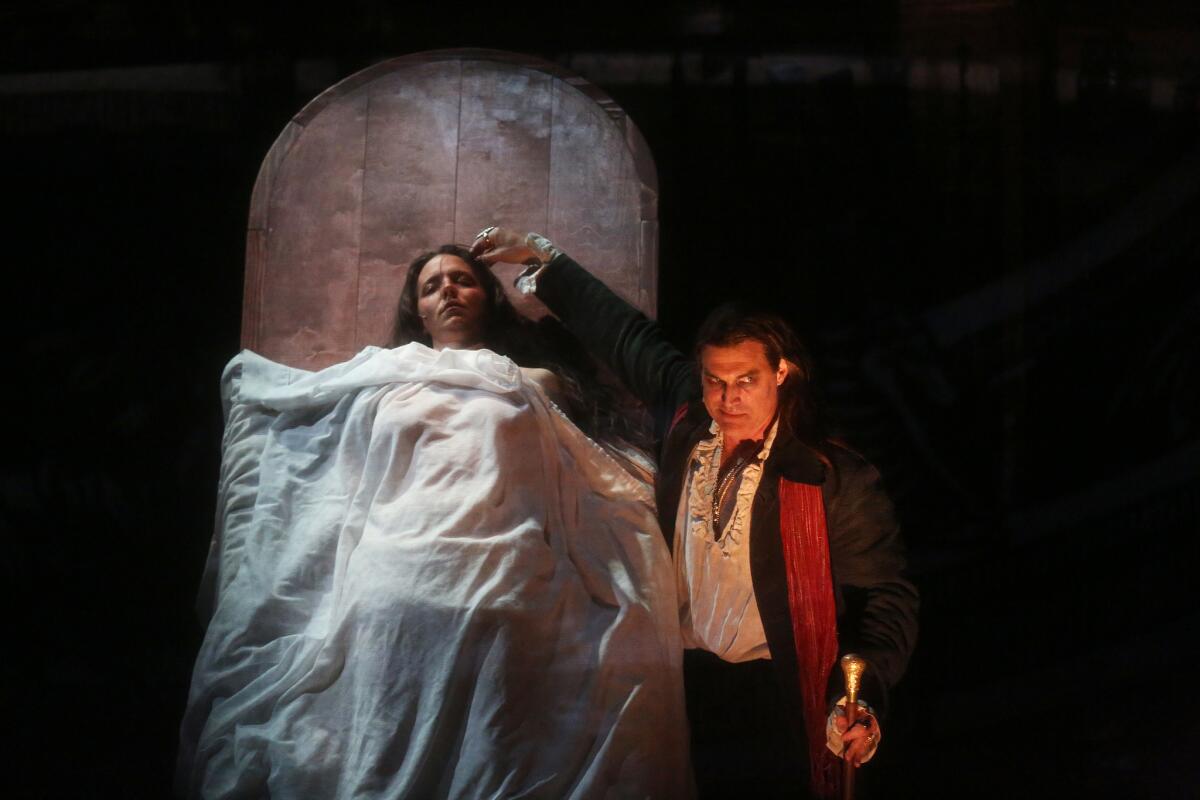
“No singers were harmed in the creation of this opera,” composer and librettist David Lang and his co-librettist and set designer Mark Dion wryly write in their short program note for “anatomy theater.” Mezzo-soprano Peabody Southwell did maybe look a little worse for wear, spending much of her time onstage as a bloody, naked corpse Thursday night at REDCAT for the premiere of this new chamber opera in Los Angeles Opera’s experimental “Off Grand” series.
No careers were harmed in the performance of this opera, either. Just the opposite. Lang’s opera and Bob McGrath’s captivating Grand Guignol production offer just the breakout role Southwell needs.
As for the audience, all bets are off. Lang’s opera is high entertainment. No plot synopsis nor extensive pre-concert talk is needed or wanted. There is no need for projected titles.
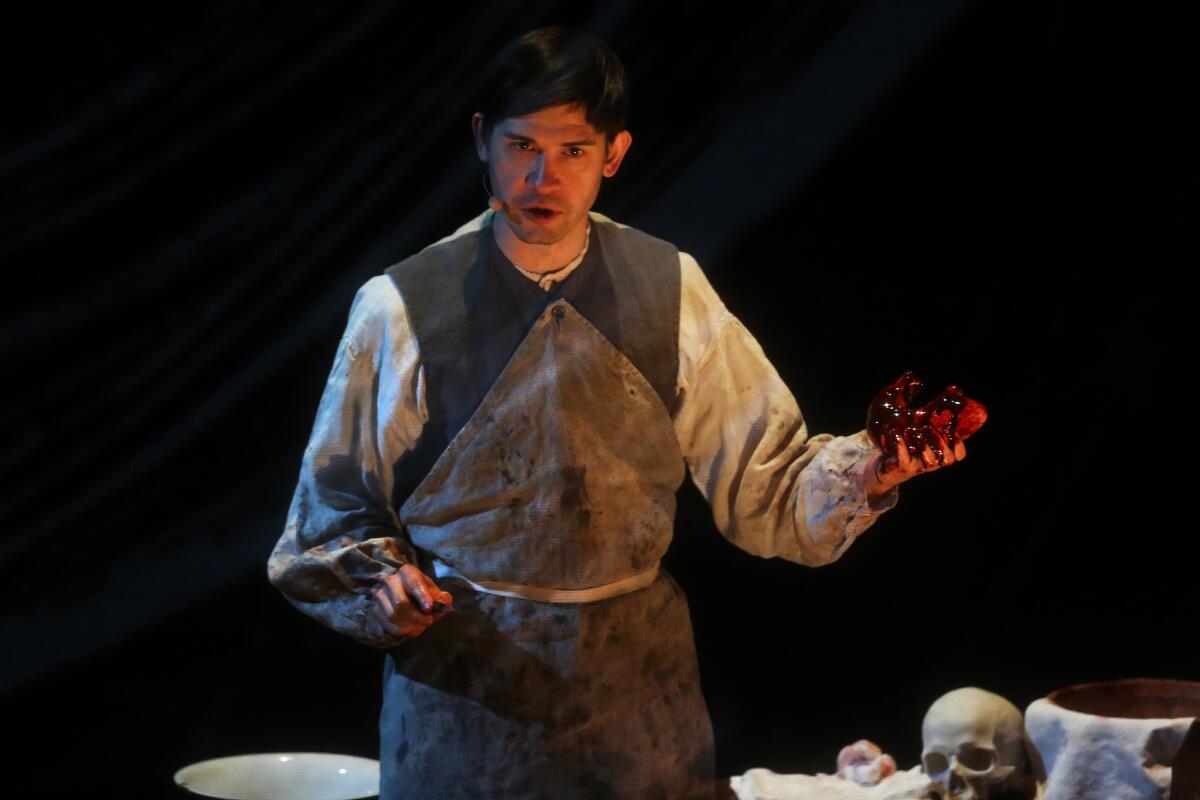
Like a musical, words are meant to be — and they easily are — understood. The theatrical experience is direct, as it was in the early days of opera.
In fact, McGrath takes the audience back to those days. Sarah Osborne, an 18th century prostitute who murdered her abusive husband and two children, is hanged in a public square and her body dissected before a gawking, paying audience in search of the anatomical source of evil.
See the most-read stories in Entertainment this hour »
The hanging takes place in the REDCAT gallery. Steins of beer and sausages from Wurstkuche are handed out ahead of the performance for those who arrive early. Musicians entertain the merry crowd, just as they did at executions. Once inside the theater, the gleeful dissection begins.
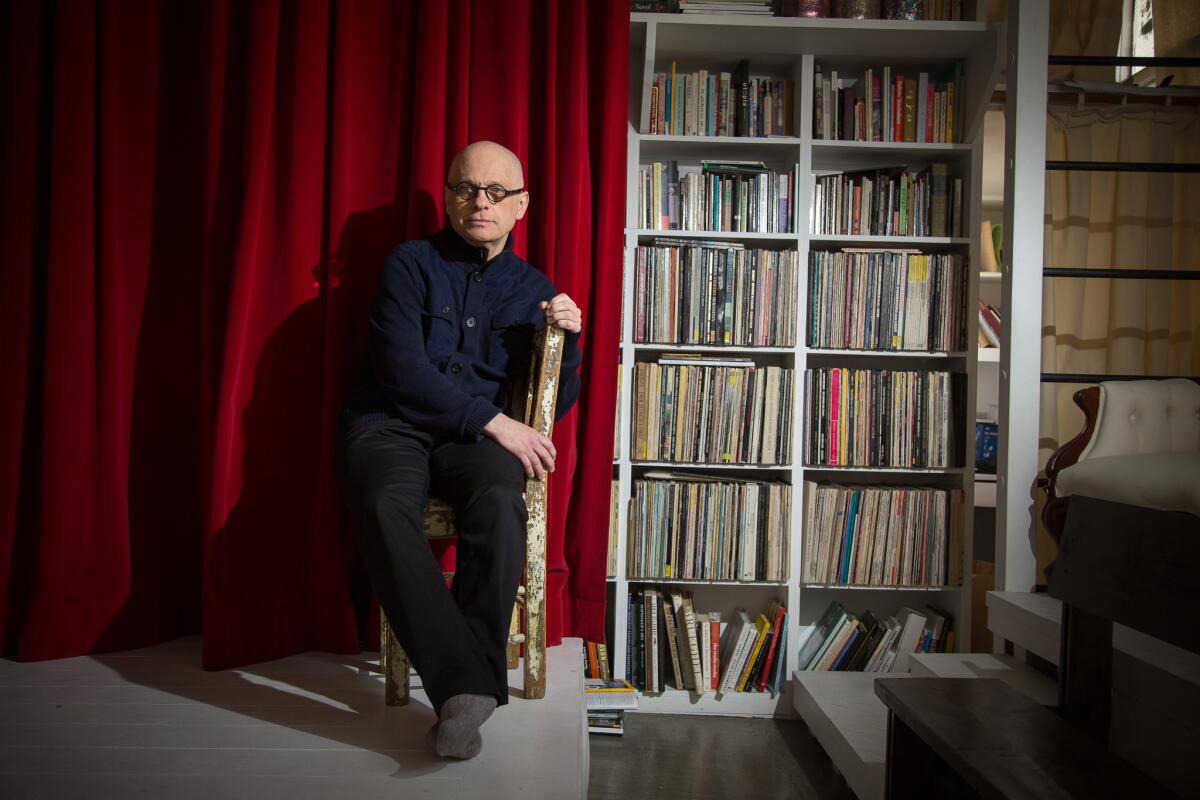
Much of “anatomy theater” is very amusing. Joshua Crouch, the caretaker of the dissection theater, is a vivacious huckster, given great charisma by the Broadway singer Marc Kudisch, who handles this opera assignment with considerable elan. Baron Peel, the sonorous bass Robert Osborne, is the sanctimonious anatomist. His young assistant who does the riotous cutting, Ambrose Strang, is sung by the riotously effective Timur.
McGrath’s production is a period piece, excellently decorated with projections of historical anatomical drawings on a scrim. Southwell just lies there, unclothed and violated, as others sing of seeking to know what the body has to tell us. They sing of their surgical instruments. They sing of organs as Strang removes them. (Warning to the squeamish, a lot of yucky stuff comes out.)
But much of “anatomy theater” is not amusing. Its theme is the one that happens to be the top of the news. What is it that makes someone commit murder? We are reminded that this search is not new. And studies tell us that domestic violence and murder are often connected. Sarah is marched out to gallows bedraggled, pathetic and offers her confession in a long aria. She sings of her youth, her hope, her abuse by her father, which leads her to a life on the street and mistreatment by her husband. In a remarkably believable performance, Southwell makes her spirit rise.
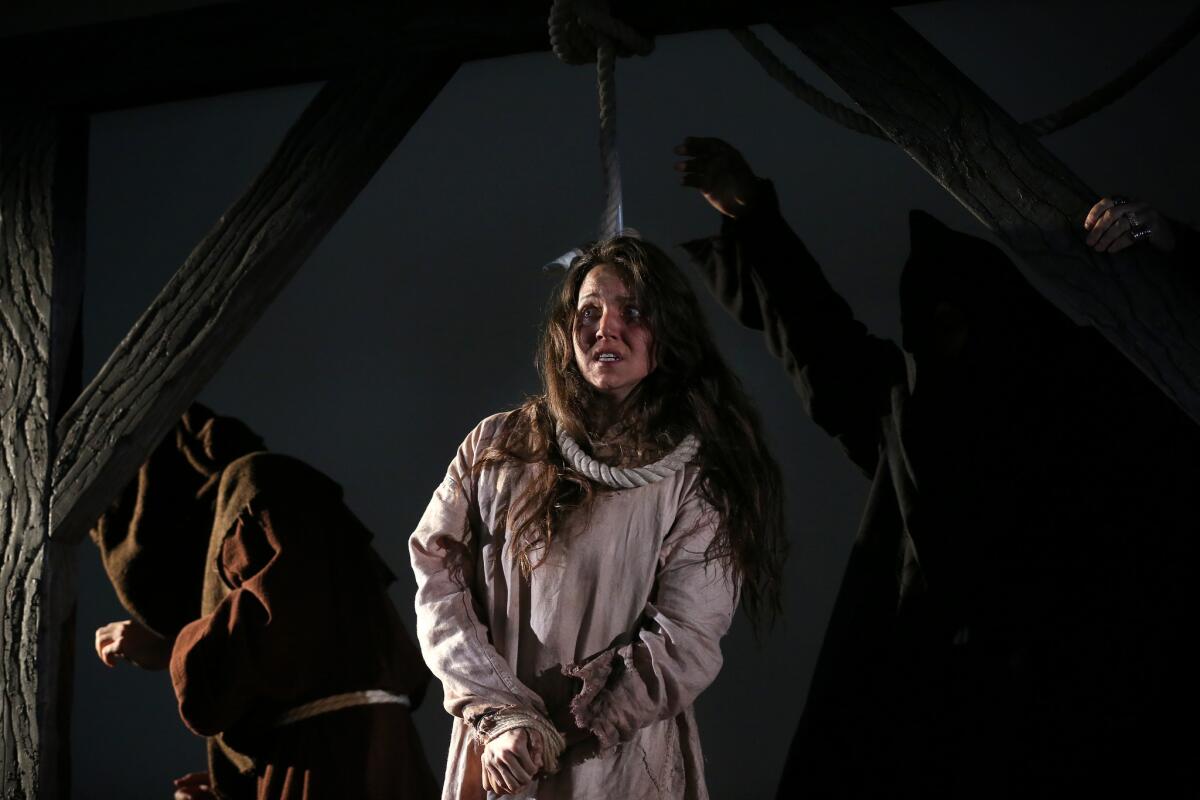
Lang’s score is quietly seductive. He writes vocal lines that underscore words in an almost Baroque manner, but makes them modern music, often with the propulsive post-Minimalist background. Years ago when he first started out, I wrote that there was no name for his kind of music. I still don’t have one, but you know it when you hear it.
Perhaps the greatest subversive achievement of “anatomy theater” is that it entertains even as you know full well that something is very wrong with this picture. At the heart of that feat is the heart. It is removed from Sarah’s cadaver, and it is a normal one, unwilling to reveal its secrets.
Then in an arrestingly haunting aria, Sarah sings of her heart, the heart that loved her children, a good heart that was perverted by society. Southwell, a gory mess looking as though she could have just been removed from a slaughter film and whose mezzo-soprano is deep and rich, brings a feeling so unreal that the murderess is the one who is pure and society perverted. It’s not who we are, she makes us understand, but what we do to each other that creates monsters. In that sense, harm, great harm, is revealed in “anatomy theater.”
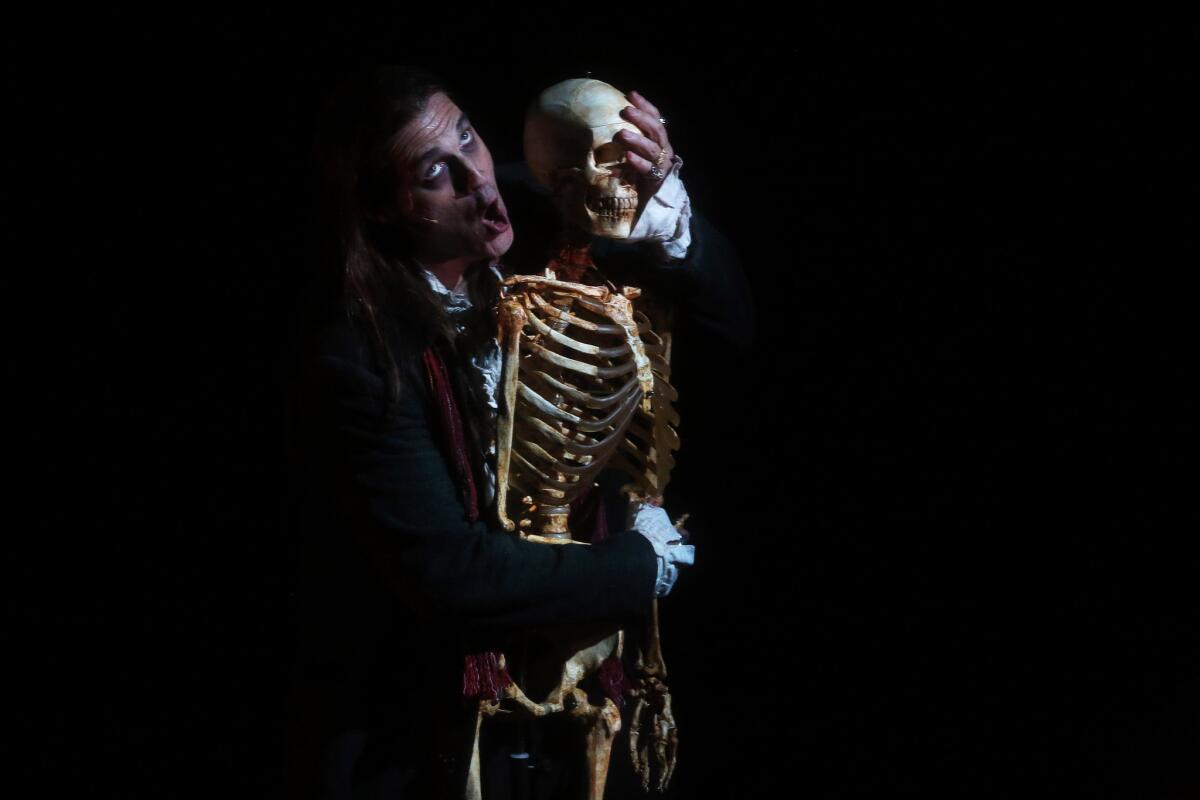
Lang and Dion don’t quite know where to go from there. The opera ends, not operatically, but with just a good night. I would like a not just Grand Guignol but grand statement, but this is opera too much of our time for that to be.
At least ‘anatomy theater’ is in part locally sourced. Though the production was created in New York by Beth Morrison Projects and Ridge Theater, Southwell and Timur are L.A.’s two most distinctive singers, and L.A.’s increasingly stellar new music ensemble, wild Up, conducted by Christopher Rountree, provided the highest possible wattage. “Off Grand” finally has its first complete triumph.
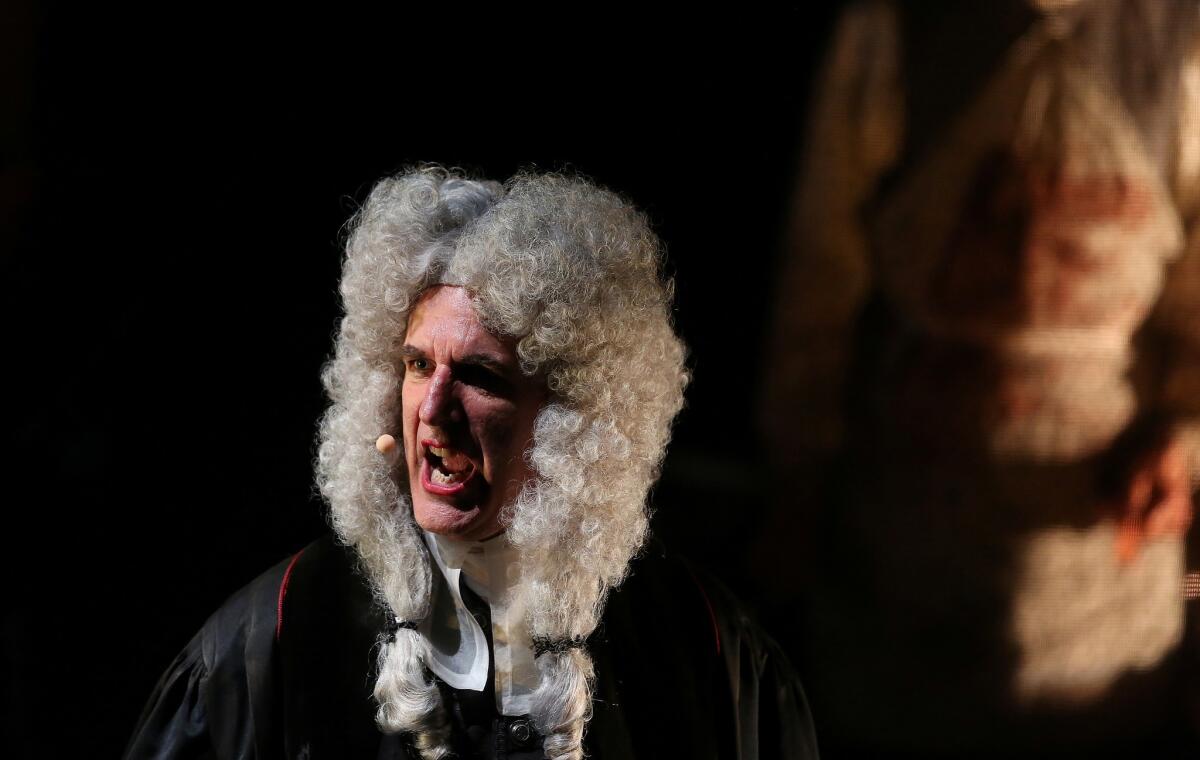
Los Angeles Opera’s “anatomy theater”
Where: REDCAT, 631 W. 2nd St., Los Angeles
When: 8 p.m. Friday-Saturday, 2 p.m. Sunday, 8 p.m. Monday
Tickets: $69
Info: (213)-972-8001, www.laopera.org
MORE:
Booed in Vienna, Dudamel makes revelatory L.A. Opera debut to frenzied cheers
Peter Sellars jump-starts the conversation at the Ojai Music Festival
Why it matters that AFI’s Lifetime Achievement Award is going to ‘Star Wars’ composer John Williams
Worlds meet and worlds beyond at Ojai Music Festival
More to Read
The biggest entertainment stories
Get our big stories about Hollywood, film, television, music, arts, culture and more right in your inbox as soon as they publish.
You may occasionally receive promotional content from the Los Angeles Times.











